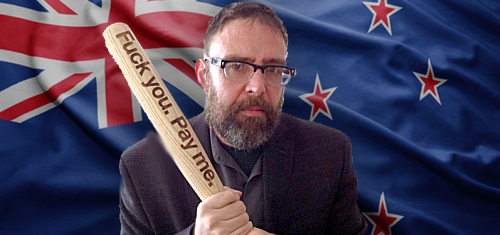 New Zealand has unveiled its plans to prevent international online gambling sites from offering their superior services to local punters.
New Zealand has unveiled its plans to prevent international online gambling sites from offering their superior services to local punters.
A year ago, Racing Minister Nathan Guy said his “number one priority” was finding a way to boost revenue for the New Zealand Racing Board’s TAB online betting site. In April, Guy announced the formation of an Offshore Betting Working Group to prepare a report on how to cut off the flow of funds to international online gambling sites.
On Tuesday, Guy gave a speech at the NZRB’s annual general meeting in which he revealed the Working Group’s findings and recommendations. (Read the full report here; the recommendations start around page 26.)
The Working Group estimates that international gambling sites earn about $58m in revenue per year from New Zealand bettors, up from $32m in 2010. Over that same span, the number of Kiwis betting with international sites has basically doubled to 40k and could double again by 2020, representing about one-quarter of the TAB’s customer base.
WHY THEY DO IT
The Working Group says Kiwi punters choose to bet with international sites because the sites offer “a broader range of products, and a greater service mix and pricing of products” than the local TAB. The report cites a single match in the State of Origin rugby competition for which the TAB offered a total of 45 betting options compared to 203 on Australian online betting operator Centrebet (part of William Hill Australia).
The TAB has often complained that international operators lure punters through better pricing, which the TAB blamed on the fact that international operators aren’t forced to subsidize local racing bodies. But the report says just 13% of bettors choose international sites for price reasons, while one-third said they switched because of a wider range of betting options.
The report slams the TAB’s “dated technology platform,” which still uses manual processes and systems to manage fixed-odds betting. Though the report doesn’t say so in so many words, the TAB’s dated technology is still in use primarily because, as a monopoly, it never really faced competitive pressure to upgrade. Until recently, that is.
THAT’S ONE FOR YOU, NINETEEN FOR ME
Refreshingly, Guy told the NZRB’s members that simply blocking access to international online gambling domains is an ineffective remedy, as “anyone who can use Google can find a way to get around this measure fairly easily.” Payment-blocking was deemed similarly insufficient, although both options could be employed if the government gets desperate.
Guy said the Working Group believed amending the Racing Act 2003 to permit the TAB to offer “a broader and more competitive range of betting products” would do more to convince Kiwi punters to bet within their borders.
But the Working Group also recommended that the government introduce legislation that would impose an Offshore Bookmaker Fee that would apply to (a) wagers placed by Kiwis with international online operators and (b) betting markets bookmakers offer on New Zealand racing and sporting events. The Group proposed a rate of between 2% and 3% of turnover, which it believes could generate $16.6m per year for the government.
BUT WILL IT WORK?
Guy noted that collecting this sum would require “an extraterritorial focus and a credible enforcement regime.” (Also helpful would be having a really good friend who belongs to The Avengers – preferably Thor, as he could easily fly from jurisdiction to jurisdiction while carrying big sacks of cash.)
The report acknowledges that implementing the international bookie fee would rely heavily on voluntary compliance in order to keep costs down. A “graduated set of enforcement measures” would be applied to non-compliant operators, but high-cost tactics, “including criminal charges and extradition proceedings, would be used sparingly and hopefully not at all.”
Guy said he’d recently discussed the problem with his counterparts in Australia, who are also struggling with how to deal with the superior offerings of international competitors. The Aussie government is due to report on its own online betting review by the end of the year, and Guy said it was “important that our policy is consistent with theirs.”
The Working Group’s other areas of study – lifting the ban on in-race betting, expanding the types of sports on which wagering is offered and prop bets – will be dealt with separately. Guy said he expects to report these recommendations to Cabinet sometime in early 2016.
